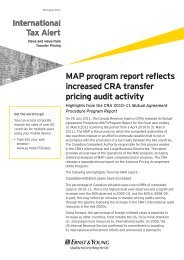Download - Ernst & Young T Magazine
Download - Ernst & Young T Magazine
Download - Ernst & Young T Magazine
Create successful ePaper yourself
Turn your PDF publications into a flip-book with our unique Google optimized e-Paper software.
Management Expatriate postings Credit: Getty / Sean Sexton<br />
“I once went to a meeting with a fellow<br />
Westerner in Japan,” recalls Ellen Shipley, Head<br />
of Mobility and International Assignments at BT,<br />
a major telecommunications company. “He took<br />
a business card from our Japanese hosts, didn’t<br />
look at it, and flipped it on the table. You just<br />
can’t do that there. There are a lot of little rules<br />
you simply have to pick up on, wherever you go.”<br />
Getting the right person<br />
Because many workers are just unsuited to<br />
conditions abroad, careful selection of the<br />
expatriate is vital. To avoid potential conflict<br />
and the resulting failure of the placement,<br />
companies routinely test for cultural sensitivity<br />
in prospective expatriates. But all too often,<br />
company headquarters will play down the<br />
importance of the test’s findings, and go ahead<br />
in selecting candidates purely on their<br />
performance on home territory. "I have seen<br />
Language ability, or at least the<br />
desire to learn, can be a key factor<br />
in helping expatriates settle in<br />
people who were superstars in their own<br />
country," recalls Efkemann. "And based on this<br />
record, their management assumes they will<br />
perform just as well in a different country.<br />
But then they fall flat on their faces because<br />
their approach didn't fit the local market at<br />
all."<br />
Cultural training, prior to departure, can teach<br />
some of the essential dos and don’ts and help<br />
reduce the risk of major clashes. Large<br />
companies also routinely offer language training<br />
to ease the transition. Although no one will<br />
become fluent in a language after a short course,<br />
a basic grounding can demonstrate respect for<br />
the local culture, and a willingness to learn more<br />
about it.<br />
Indeed, language ability, or at least the desire<br />
to learn, doubtless correlates strongly with the<br />
cultural sensitivity that is so essential to<br />
expatriate success. After all, it must be difficult<br />
to be sensitive to a culture when you have very<br />
little idea what is being said around you. The<br />
Economist Intelligence Unit survey seems to<br />
confirm this link. Former expatriates were much<br />
more likely to crave another posting if they found<br />
dealing with a foreign language to be “highly<br />
attractive.”<br />
Despite the apparent benefits of cultural<br />
and language training, the current economic<br />
climate is prompting some companies to cut back<br />
on it. “There is a real lack of understanding<br />
within the corporate world about what it actually<br />
means to pack up and move to another country,”<br />
says Shipley. “Consequently, when times are<br />
hard, heads of departments can see the<br />
investments that have traditionally been made to<br />
help an expatriate settle as dispensable items.”<br />
5 key measures that can help boost the success of a placement<br />
Improving the odds<br />
__ No strategy can guarantee the<br />
success of an expatriate placement.<br />
However, companies can certainly<br />
adopt measures to facilitate their<br />
employee’s transition, and thus<br />
increase the likelihood that he or<br />
she will excel in a foreign<br />
environment.<br />
1. Choose the right individual<br />
The key issue of selection is too<br />
often downplayed, with companies<br />
often believing that domestic star<br />
performers will automatically<br />
reach a similar standard within a<br />
completely alien culture. Robust<br />
selection procedures which ensure<br />
that the individual is flexible and<br />
sensitive enough to recognize and<br />
adapt to cultural differences are<br />
essential.<br />
2. Offer cultural and language training<br />
Provided that prospective expatriates<br />
possess this necessary openness,<br />
cultural training will educate them<br />
about the key differences in approach<br />
and behavior that they are likely<br />
to encounter in their new country.<br />
Language training can teach the<br />
basics, and thus help to show<br />
a welcome interest in the host<br />
culture.<br />
Relocations on the rise<br />
International relocations,<br />
especially among service<br />
firms, have risen steadily<br />
for three years in a row,<br />
rebuilding since a 2009<br />
low. In 2011, 28% of firms<br />
globally expected an<br />
increase in the number of<br />
relocations abroad,<br />
according to Atlas' 2011<br />
Corporate Relocations<br />
Survey.<br />
3. Allow the family time to commit<br />
wholeheartedly<br />
Rushed decisions to spend several<br />
years away from family, friends and<br />
a familiar setting can quickly be<br />
regretted. Companies should insist<br />
that the whole family contemplates<br />
all the personal repercussions of the<br />
placement before consenting to<br />
it. A paid-for “look-and-see” trip<br />
will aid this decision-making process.<br />
4. Support the entire family<br />
Family discontent frequently<br />
undermines the success of an<br />
expatriate placement. Companies<br />
can help to integrate spouses by<br />
introducing them to others in a<br />
similar situation, or by assisting<br />
them to find work that is appropriate<br />
for someone of their level. (According<br />
to the Permits Foundation, 82% of<br />
expatriate spouses or partners have<br />
a university degree.)<br />
5. Appoint a good destination service<br />
provider<br />
Once ensconced in their new country,<br />
a destination service provider can<br />
teach the family all the necessary<br />
practicalities, such as how to pay<br />
utility bills and where to go shopping<br />
for various items.<br />
32 T <strong>Magazine</strong> Issue 07 <strong>Ernst</strong> & <strong>Young</strong>

















